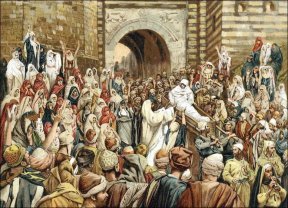
 ERHAPS YOU WORK in a parish office; perhaps you work in a classroom; perhaps you work in both. Most musicians work odd hours, but imagine for a moment that you have a 9-to-5 job. Now imagine that it’s 4:30 on Friday afternoon. It’s been a long week, and you’ve gotten a lot of things done. At this point, no one is starting any new projects. Then the phone rings. This could be anything, so you (along with all your coworkers) are hesitant to answer, for fear that the person on the other end might want something more complicated than you’re interested in getting involved with at this point in the week. The temptation is there to ignore the phone and just breeze into the weekend.
ERHAPS YOU WORK in a parish office; perhaps you work in a classroom; perhaps you work in both. Most musicians work odd hours, but imagine for a moment that you have a 9-to-5 job. Now imagine that it’s 4:30 on Friday afternoon. It’s been a long week, and you’ve gotten a lot of things done. At this point, no one is starting any new projects. Then the phone rings. This could be anything, so you (along with all your coworkers) are hesitant to answer, for fear that the person on the other end might want something more complicated than you’re interested in getting involved with at this point in the week. The temptation is there to ignore the phone and just breeze into the weekend.
Take another example. I like to hike & camp & backpack, so imagine you are on a long backpacking trip. You have just finished a 15-mile day, and you’re approaching your campsite for the night. The first thing you want to do is take your boots off, sit down, and relax a bit. But you know that someone needs to set up the stove immediately and get some water boiling for dinner. The temptation is there to slip into the background and let somebody else deal with it so you can go on relaxing.
We have all been in similar situations, and so has Jesus. One day, Jesus came to the end of a long day’s hike to a city called Nain. As He and the large crowd with Him approached the city gate, they found a big funeral procession leaving the city. Yes, Jesus is fully divine, but He is also fully human, so I am very certain that, after a long day’s journey, the last thing He wanted to get involved with was a funeral procession and a grieving family. Yet our Lord does not allow that merely human inclination to get the better of Him. Instead, He rises above that. According to the Gospel, “He stepped forward.” He could have snuck back into the crowd or hid behind a rock or entered the city through a different gate. But He didn’t. Why?
Because, according to St. Luke, “He was moved with pity” for the woman who was not only the boy’s mother, but also a widow. In other words, Jesus allowed Himself to feel compassion for the poor widow of Nain. To be compassionate means, literally, to be able to “suffer with” the poor and downtrodden. It seems like the world wants to tell us that real men can’t be compassionate, though. Do you get the sense sometimes that, in the eyes of the world, authentic masculinity means remaining detached, unemotive, “strong”? I daresay that a man who cannot feel compassion is not “strong,” but weak & cold. Jesus is the greatest model of manhood there ever was, and He shows by example that compassion is not just for mothers.
This doesn’t mean, of course, that we all have to go around weepy and crying and pretending to be “sensitive,” but we do have to show true compassion. So, men: let’s reclaim what it means to be strong men who can recognize the needs of others and not be cold and unresponsive. Women: demand true manhood from the men in your life.
Jesus could have avoided the encounter with widow of Nain, but He chose instead to step forward and get involved. He could have given in to the human inclination to stay out of it, but He allowed Himself to be “moved with pity” for the poor woman. A real man is a man of compassion, and a man of compassion is a man of service. Can we—men and women—do the same? Can we be moved by compassion to step forward and be of service to those who suffer around us? We must, because the Gospel demands this of us.

